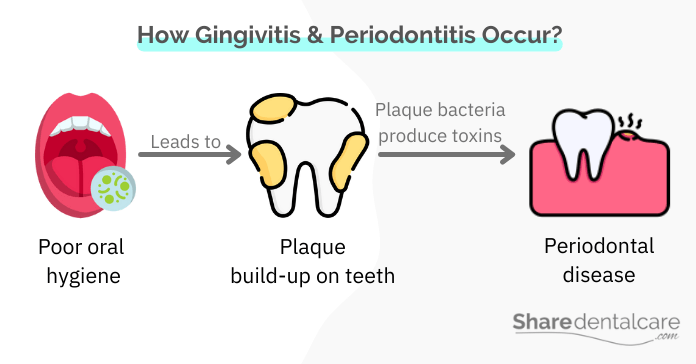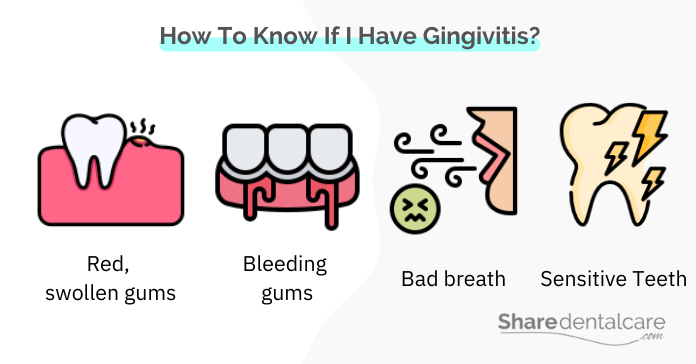Gingivitis is a common condition that affects most people at some point in their lives, and while it’s relatively harmless for most, it can be serious if left untreated. Most people don’t know they have gingivitis until it becomes advanced because the periodontal disease causes no pain in the early stage. So, many patients ask their dentist “How To Know If I Have Gingivitis?”. In this article, I have tried to explain when and how we can know about the presence of gingivitis.
What is Periodontal Disease?
Periodontal disease, also known as gum disease, is a bacterial infection that causes inflammation of the gums and tissues that support your teeth. If periodontal disease is left untreated, the infection may spread to other parts of the body, causing serious health problems. Before answering this question “how to know if I have gingivitis?” you should know the stages of periodontal disease because each stage has its signs and symptoms. Stages of periodontal diseases include:
- Gingivitis: it is the start of gum disease that usually affects only the gums. If left untreated, it can progress to periodontitis.
- Periodontitis: it is a more advanced stage of periodontal disease that occurs due to the spread of bacterial infection to the tooth-supporting tissues. Periodontitis is like serious health problems such as heart disease and diabetes.
How Gingivitis & Periodontitis Occur?
The main cause of periodontal disease is plaque, a soft film that constantly forms on the teeth. The gingivitis-causing bacteria in the plaque produce toxins that irritate the gums. If not removed, plaque hardens into tartar. If left untreated for a long time, the toxins that are produced by plaque and tartar cause tissue damage to your gums and other tooth-supporting structures. The following factors increase the risk of plaque buildup, bacterial growth, and periodontal disease:
- Poor oral hygiene. Learn more about how poor oral hygiene with braces increases the risk of gingivitis.
- Smoking or chewing tobacco. Learn more about the link between smoking and gum disease.
- Hormonal changes during pregnancy (pregnancy gingivitis).
- Poor diet and vitamin deficiency.
- Medications such as steroids or chemotherapy drugs.
- Medical conditions such as diabetes and HIV.

How To Know If I Have Gingivitis?
The gingivitis symptoms are painless, which makes it hard to know if you have gingivitis. A visual exam is the best way to know if you have gingivitis. Signs and symptoms of gingivitis include:
- Red Gums: Healthy gums are pink in color. Redness means inflamed gums, which is a sign of gingivitis.
- Puffy or swollen gums: healthy gums lie flat against your tooth. Gums swell when they become inflamed.
- Bleeding Gums: healthy gums do not bleed. The bleeding usually occurs when you brush or floss.
- Bad breath: bacteria in the mouth decompose food particles and cause a foul odor. If you maintain good oral hygiene and still have bad breath, this could be a symptom of gingivitis.
- Mild gum recession: healthy gums fit tightly around teeth. Inflamed gums may begin to pull away from teeth, exposing the tooth root. The exposed roots may cause sensitive teeth. Learn more about the differences between gingivitis vs healthy gums.
- Gums are tender to touch: the gum soreness results from your immune system’s response to the plaque bacteria that are causing inflammation and irritation of the gums.

What Happens If Gingivitis is Left Untreated?
The periodontium is the supporting tissue of the tooth, for example, the gums, bones, and ligaments. These tissues hold your teeth in place and support their functionality. If gingivitis is left untreated, the bacterial infection will spread to the tooth-supporting tissues, destroying the bone and ligaments that hold the teeth in place. Eventually, your teeth will become loose and fall off. So, if you know that you have gingivitis or suspect that you might be developing it, you should visit your dentist as soon as possible. Find out “Is gingivitis contagious through kissing?”.
How To Know If I Have Early Gingivitis or Advanced Periodontist?
The above-mentioned signs and symptoms of gingivitis may gradually worsen over time to cause advanced periodontitis. Signs and symptoms of periodontist include:
- Pain when chewing food.
- Chronic bad breath and halitosis.
- Moderate to severe gum recession.
- Periodontal pockets.
- Severe bone loss.
- Development of spaces between teeth.
- Loose teeth or tooth mobility.
- Tooth loss.
The best way to know if you have gingivitis or periodontitis is by visiting your dentist to know the severity of the gum disease. Your dentist will know whether you have an early or advanced stage of gum disease after a visual examination and diagnostic tests such as x-rays, periodontal probe tests, and other tests.
How Gingivitis is Treated?
Gingivitis is a reversible condition that can be treated with good oral hygiene habits and professional teeth cleaning. Antibiotics and surgery are required in the case of advanced periodontitis. To reverse gingivitis, you should:
- Brush your teeth twice daily with fluoride toothpaste, even if you have gum bleeding.
- Floss your teeth once a day.
- Eat a nutritious diet.
- Limit your intake of sugar and starches.
- Smokeless or quit smoking completely.
- Visit your dentist regularly for teeth cleaning and prevention.
- Visit your dentist or oral hygienist regularly for professional teeth cleaning.
How To Know If I Have Gingivitis – Conclusion
If your gums are red, swollen, or bleed with brushing, you could have gingivitis. However, The best way to know whether you have gingivitis or periodontitis is by visiting your dentist. Your dentist will know the severity of gum disease after a visual examination and diagnostic tests such as x-rays, periodontal probe tests, and other tests.
Gingivitis is a reversible condition that can be treated with good oral hygiene habits and professional teeth cleaning. However, if it is left untreated it may cause severe periodontitis, which can cause damage to the tooth-supporting tissues and lead to tooth loss.